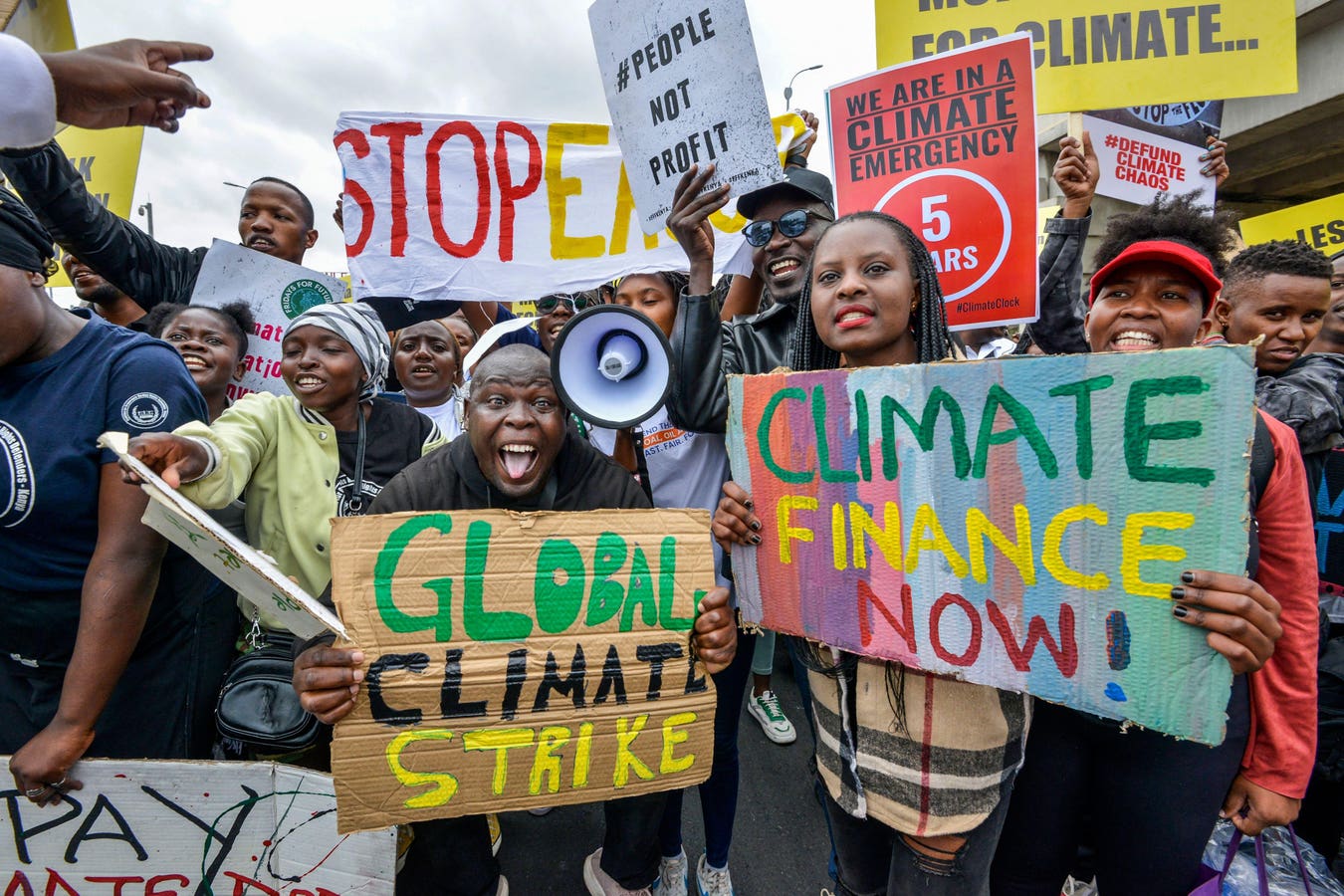TOPSHOT – Climate activists hold placards and chant slogans as they take part in a march in Nairobi on September 4, 2023. The activists from various nationalities urged delegates attending the Africa Climate Summit in Nairobi to engage actively in discussions to expedite the phase-out of fossil fuels. (Photo by Suleiman Mbatiah / AFP) (Photo by SULEIMAN MBATIAH/AFP via Getty Images)
AFP via Getty Images
Africa stands at the forefront of the climate crisis, grappling with a unique set of environmental challenges, including rapid desertification, widespread deforestation and resource scarcity. As we look ahead to 2026, a new generation of passionate leaders is rising alongside established figures, spearheading climate action and championing sustainable futures across Africa. As we look ahead to 2026, these eight African environmentalists, rising stars and established leaders alike, are helping to redefine climate action across the continent, from the streets to the policy rooms.
1. Vanessa Nakate (Uganda)
Vanessa Nakate is a leading figure in Africa’s climate justice movement from Uganda. She has been a consistent and growing voice at major international forums, from the United Nations Climate Change Conferences to the World Economic Forum to even critical meetings with world leaders on habitat loss and damage. Nakate’s activism began in January 2019, with solitary climate strikes in Kampala, drawing immediate attention to the climate crisis in her country.
She is the founder of both the Youth for Future Africa and the Rise Up Movement, dedicated to using nonprofits to amplify the voices of African youth. Nakate is also a UNICEF Goodwill Ambassador. Her advocacy work has been centered on highlighting the disproportionate impacts of climate change on African communities and promoting tangible solutions, such as advocating for the installation of solar power in Ugandan schools. Uganda historically has one of the lowest electricity access rates in East Africa.
2. Fatou Jeng (The Gambia)
Fatou Jeng is a young Gambian climate activist who has made a significant impact on both local and international stages. Her influence was recognized early, as she was named among the 30 most influential young Gambians of 2019 by WhatsOn-Gambia and featured on Forbes Africa’s 30 Under 30 list. As the founder of Clean Earth Gambia, she has mobilized students in her country for climate education and led a massive tree-planting initiative, resulting in more than 30,000 trees, according to the nonprofit’s own estimate.
The Gambia is highly vulnerable to sea-level rise and coastal erosion due to its geographical position, with a large percentage of its population living in coastal areas. Jeng also actively contributes to policy discussions at the United Nations Framework Convention on Climate Change, where she brings a critical youth perspective to global negotiations.
3. Ineza Umuhoza Grace (Rwanda)
Ineza Umuhoza Grace is a leading Rwandan activist known for her work in climate change advocacy and youth empowerment. She is a co-coordinator of the Loss and Damage Youth Coalition, a global initiative that advocates for equitable financial and technical support for communities most vulnerable to the irreversible impacts of climate change. Rwanda is susceptible to climate-induced disasters, particularly landslides and floods that have become more frequent posing a risk to agricultural land and infrastructure.
As a leading champion for loss and damage, Grace’s role will be central to many of Africa’s climate agendas leading up to and in 2026. For many in Africa, a continent that contributes the least to global emissions yet suffers the most from climate impacts, loss and damage is seen as a matter of climate justice, not just a policy issue. She is also the founder and CEO of The Green Protector, a nonprofit organization focused on equipping young people with the knowledge and tools to take meaningful action on environmental issues.
4. Nyombi Morris (Uganda)
Nyombi Morris is an African environmental activist known for his work in promoting climate justice and gender equality. In Uganda, a major of the population depend on climate-sensitive sectors like agriculture and fisheries. His activism was sparked by the devastating floods and rains in Uganda. In late 2024, Morris was forced to flee Uganda due to ‘fierce backlash’ against his human rights activism and is now based in exile.
Despite this, he continues to be a leading youth voice, consistently championing African goals from abroad and ensuring his impact will be felt in 2026. Morris is the CEO of the non-profit organization Earth Volunteers and serves as a prominent ambassador for UNOCHA. He has also been recognized by CNN as an “Environmentalist of Tomorrow” in 2021.
5. Kayinajah Inyang (Nigeria)
Kayinajah Inyang is a Youth Climate Ambassador and Change Activist from Nigeria. Unlike many activists who confront systems head-on, Kayinajah’s approach is focused on changing the system from within. Through lobbying efforts with various African governments, he has helped shape youth-inclusive environmental and climate policies across the continent. A strategy that contrasts with the more common direct protest approach. As per the United Nations Population Fund, Nigeria and Africa at large has a rapidly growing youth population, with about 60% of citizens under the age of 25, making youth inclusion critical for effective policy implementation.
He has been a consistent representative of the African youth voice at major climate conferences, from COP27 to COP29, and is currently leading efforts to drive African youth participation in COP30. Inyang is also known for his crucial work in helping African environmental/climate tech firms secure vital funding for their projects, effectively directing financial resources toward environmental, climate and sustainability solutions. For context, in 2024, climate tech was one of the top three sectors for startup funding in Africa. According to The Big Deal “1 in 3 dollars” invested in startups across the continent went to climate tech startups.
6. Anita Soina (Kenya)
Anita Soina is a popular Kenyan environmentalist, politician, and social media influencer. At just 18 years old, Anita founded Restoration Warriors Africa (formerly Spice Warriors), an environmental organization that mobilizes youths to become environmentally conscious. She also established The Soina Foundation, which addresses social issues such as sexual health education, gender-based violence , clean water and broader sanitation initiatives.
A member of the Maasai community, she was the youngest Member of Parliament candidate in Kenya in 2022. Her environmental advocacy has taken her across Africa, from Kenya to Nigeria, where she has collaborated with prominent figures like Nigerian Environmentalist Lawmaker, Senator Ned Nwoko. She has represented the youth voice at numerous global conferences, including COP26, UNEA 5, Stockholm+50, and COP27. Anita Soina is also the 2023-2024 Global Youth Champion for Sanitation and Water for All .
7. Diolu Tobechukwu Prosper (Nigeria)
Diolu Tobechukwu Prosper is a Nigerian climate justice advocate and environmental rights defender. He is known for his bold advocacy work in documenting the realities of oil spills and environmental pollution in communities, often at great personal risk, to create powerful documentaries that amplify the voices of the youth. The Niger Delta region in Nigeria has experienced thousands of oil spills in the last 60 years, with “disastrous” impacts on local ecosystems and livelihoods, according to the United Nations.
As the founder of the Lincgreen Climate Change Initiative and the convener of the “Look Beyond Oil” campaign, he has mobilized numerous stakeholders and young people for local climate action. Prosper has also led multiple climate street protest campaigns in Nigeria and his work has led to the establishment of a Flood Emergency Response Team, which champions adaptation frameworks for hard-to-reach coastal communities.
8. Hindou Oumarou Ibrahim (Chad)
Hindou Oumarou Ibrahim is a Chadian environmental activist and geographer. Various studies including a recent research paper by the International Organization for Sustainable Development have stated that Chad is highly susceptible to desertification, with the Sahara Desert advancing threatening pastoral and agricultural communities. Ibrahim has been a consistent presence at major environmental and climate events, serving as a co-director of the World Indigenous Peoples’ Initiative and Pavilion at COP21, COP22, and COP23.
Her expertise is frequently sought after in global climate policy discussions, as she spearheads efforts to integrate indigenous knowledge into international climate policies. Ibrahim is the Coordinator of the Association of Peul Women and Autochthonous Peoples of Chad, where she works to protect indigenous cultures and traditions in the face of environmental change.
Turkana women hold a placard as they take part in a march in Nairobi on September 4, 2023. The activists from various nationalities urged delegates attending the Africa Climate Summit in Nairobi to engage actively in discussions to expedite the phase-out of fossil fuels. (Photo by Suleiman Mbatiah / AFP) (Photo by SULEIMAN MBATIAH/AFP via Getty Images)
AFP via Getty Images
The efforts of these environmental leaders reflect a crucial and growing response to Africa’s climate challenges. Their work, ranging from grassroots community mobilization to high-level policy advocacy, is especially vital given the continent’s rapidly expanding population.
According to a 2025 Pew Research Center analysis based on UN data, Africa is the only world region projected to have strong population growth for the remainder of this century, with its population expected to increase from about 1.3 billion to 4.3 billion by 2100. This demographic trend means that half of the babies born worldwide will be born in Africa by the end of the century. As the population grows, so too does the pressure on natural resources and the need for sustainable solutions.
Studies, such as one co-authored by researchers at Stanford University, highlight that reversing environmental decline in Africa requires long-term, community-led initiatives that integrate poverty reduction with environmental restoration. This collective action, spearheaded by a new generation of leaders, is key to building a resilient and sustainable future for a continent at the center of the global climate conversation.









